高二英语学案units 3-4
- 格式:doc
- 大小:84.50 KB
- 文档页数:10
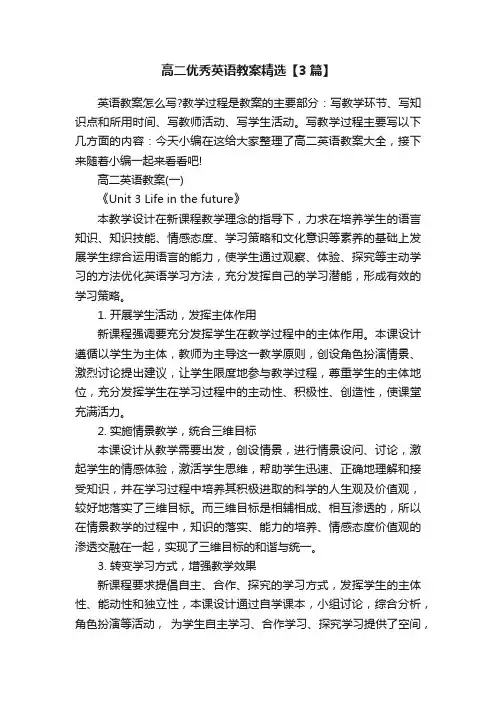
高二优秀英语教案精选【3篇】英语教案怎么写?教学过程是教案的主要部分:写教学环节、写知识点和所用时间、写教师活动、写学生活动。
写教学过程主要写以下几方面的内容:今天小编在这给大家整理了高二英语教案大全,接下来随着小编一起来看看吧!高二英语教案(一)《Unit 3 Life in the future》本教学设计在新课程教学理念的指导下,力求在培养学生的语言知识、知识技能、情感态度、学习策略和文化意识等素养的基础上发展学生综合运用语言的能力,使学生通过观察、体验、探究等主动学习的方法优化英语学习方法,充分发挥自己的学习潜能,形成有效的学习策略。
1. 开展学生活动,发挥主体作用新课程强调要充分发挥学生在教学过程中的主体作用。
本课设计遵循以学生为主体,教师为主导这一教学原则,创设角色扮演情景、激烈讨论提出建议,让学生限度地参与教学过程,尊重学生的主体地位,充分发挥学生在学习过程中的主动性、积极性、创造性,使课堂充满活力。
2. 实施情景教学,统合三维目标本课设计从教学需要出发,创设情景,进行情景设问、讨论,激起学生的情感体验,激活学生思维,帮助学生迅速、正确地理解和接受知识,并在学习过程中培养其积极进取的科学的人生观及价值观,较好地落实了三维目标。
而三维目标是相辅相成、相互渗透的,所以在情景教学的过程中,知识的落实、能力的培养、情感态度价值观的渗透交融在一起,实现了三维目标的和谐与统一。
3. 转变学习方式,增强教学效果新课程要求提倡自主、合作、探究的学习方式,发挥学生的主体性、能动性和独立性,本课设计通过自学课本,小组讨论,综合分析,角色扮演等活动,为学生自主学习、合作学习、探究学习提供了空间,使学生体验了自主之乐,合作之趣,探究之悦,促进了学生知识的构建与运用,能力的培养和提高,情感体验和态度、价值观的形成,增强了教学效果。
4. 运用问题教学,启发学生思维本课设计按照诱思探究理论要求,遵循学生的认知规律,引导学生去发现问题、分析问题和解决问题,从而掌握知识,形成能力,培养品质。
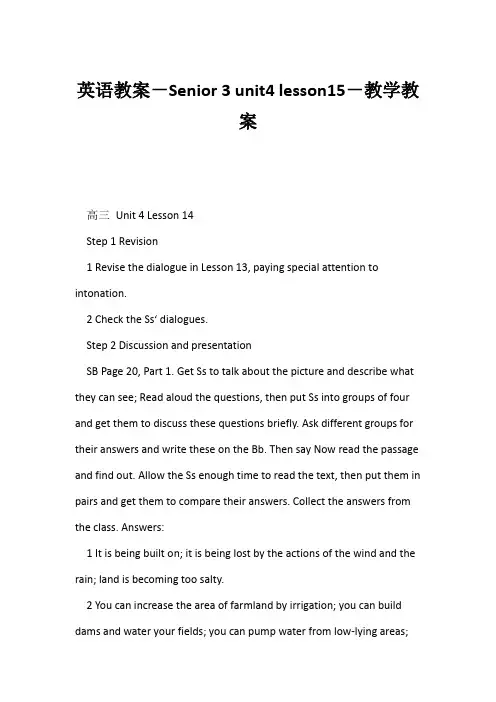
英语教案-Senior 3 unit4 lesson15-教学教案高三Unit 4 Lesson 14Step 1 Revision1 Revise the dialogue in Lesson 13, paying special attention to intonation.2 Check the Ss‘ dialogues.Step 2 Discussion and presentationSB Page 20, Part 1. Get Ss to talk about the picture and describe what they can see; Read aloud the questions, then put Ss into groups of four and get them to discuss these questions briefly. Ask different groups for their answers and write these on the Bb. Then say Now read the passage and find out. Allow the Ss enough time to read the text, then put them in pairs and get them to compare their answers. Collect the answers from the class. Answers:1 It is being built on; it is being lost by the actions of the wind and the rain; land is becoming too salty.2 You can increase the area of farmland by irrigation; you can build dams and water your fields; you can pump water from low-lying areas;you can develop new plants which produce heavier crops; you can develop new plants which grow in poor soil; you can develop new plants that are less likely to be attacked by pests and diseases.Step 3 Rome. It has about 160 members. The purpose of the organization is to improve rural conditions, agricultural production and distribution, and to raise nutritional levels.i in storage = while it is being stored。
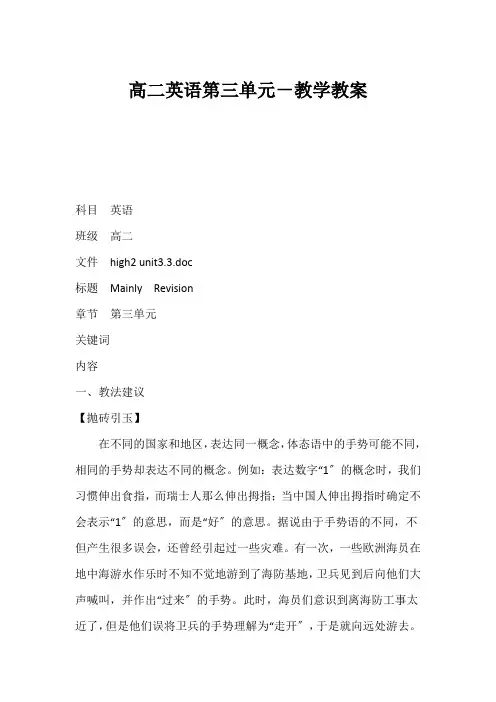
高二英语第三单元-教学教案科目英语班级高二文件high2 unit3.3.doc标题Mainly Revision章节第三单元关键词内容一、教法建议【抛砖引玉】在不同的国家和地区,表达同一概念,体态语中的手势可能不同,相同的手势却表达不同的概念。
例如:表达数字“1〞的概念时,我们习惯伸出食指,而瑞士人那么伸出拇指;当中国人伸出拇指时确定不会表示“1〞的意思,而是“好〞的意思。
据说由于手势语的不同,不但产生很多误会,还曾经引起过一些灾难。
有一次,一些欧洲海员在地中海游水作乐时不知不觉地游到了海防基地,卫兵见到后向他们大声喊叫,并作出“过来〞的手势。
此时,海员们意识到离海防工事太近了,但是他们误将卫兵的手势理解为“走开〞,于是就向远处游去。
警惕的卫兵马上开枪打死了这些不幸者。
在西方国家,有一些特殊的、人们都遵循的法规。
不敲门是不能翻开关闭的门的;不受邀请是不能进入私人住宅的,当然你自己的住宅除外。
在收到礼物时,西方人总是教孩子们说“感谢〞。
对于西方人来说,吃饭出声音被视为是不礼貌的,然而在有些国家,这是适宜地表达你爱吃仆人给你的食物。
看来,假设你不知道其它国家的这些法规,你就会犯可笑的错误。
通过学习本单元,同学们将了解到一些有关身势语的学问,这在跨国语言文化间的交际中具有格外重要的作用。
【教导迷津】A.单元重点新词读音归类1.[ ]manage handshake Arab manner2.[ai]type dining-room3.[d ]gesture juice4.[ ]composition nod5.[u:]communicate juice6.[ei]handshake wave Asian communicate7.[i:]agreement disagreement8.[i]manage composition kiss distance fist9. [ n]composition Asian10.[ ]handshake Asian11.[ ]composition agreement disagreement Arab custom manner distance communicate comfortableB.单元重点新词透视1.manage(1)作及物动词用是“管理、经营;支配,运用;把握〞。
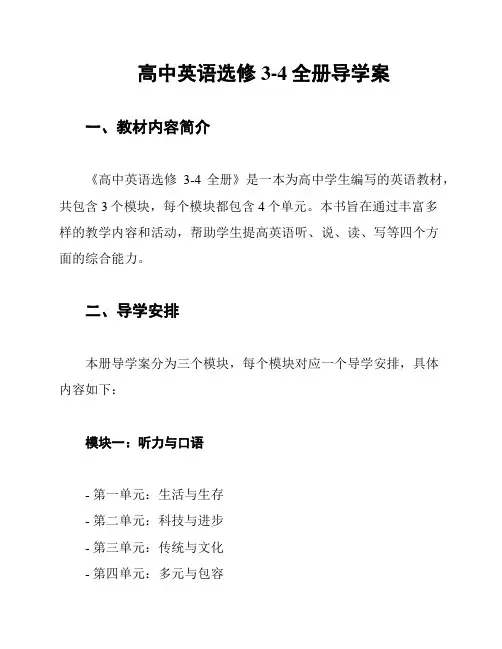
高中英语选修3-4全册导学案一、教材内容简介《高中英语选修3-4全册》是一本为高中学生编写的英语教材,共包含3个模块,每个模块都包含4个单元。
本书旨在通过丰富多样的教学内容和活动,帮助学生提高英语听、说、读、写等四个方面的综合能力。
二、导学安排本册导学案分为三个模块,每个模块对应一个导学安排,具体内容如下:模块一:听力与口语- 第一单元:生活与生存- 第二单元:科技与进步- 第三单元:传统与文化- 第四单元:多元与包容模块二:阅读与写作- 第五单元:历史与社会- 第六单元:知识与智慧- 第七单元:环境与保护- 第八单元:未来与梦想模块三:文学与鉴赏- 第九单元:文化与艺术- 第十单元:音乐与舞蹈- 第十一单元:美食与文化- 第十二单元:电影与文学三、研究目标- 通过研究模块一,学生将提高自己的听力和口语表达能力,掌握生活、科技、传统和多元文化等方面的英语表达。
- 通过研究模块二,学生将提升自己的阅读和写作能力,了解历史、社会、知识、环境保护以及未来展望等方面的英语知识。
- 通过研究模块三,学生将培养自己的文学鉴赏能力,探索文化、艺术、音乐、舞蹈、美食和电影等方面的英文研究。
四、研究安排根据教材的分布,我们将采用以下研究安排:- 每周研究一个单元的内容,每天安排相应的听说读写训练。
- 模块一和模块二的训练以听力和口语、阅读和写作为主,模块三的训练以文学鉴赏为主。
- 每周末进行知识点总结和小测验,以便复和检验研究效果。
五、研究资源- 利用教材中的相关练题、听力材料和阅读文章进行练和训练。
- 寻找额外的听力材料、阅读文章或者英语研究网站进行补充研究。
六、研究评估- 参与课堂讨论和活动,提升口语表达能力。
- 参加听力和阅读的测试,检验听力和阅读理解能力。
- 完成书中的写作任务和课后题,提高写作能力和语法运用。
以上为《高中英语选修3-4全册导学案》的内容安排和学习安排,请学生们根据这个导学案制定自己的学习计划,提高自己的英语综合能力。
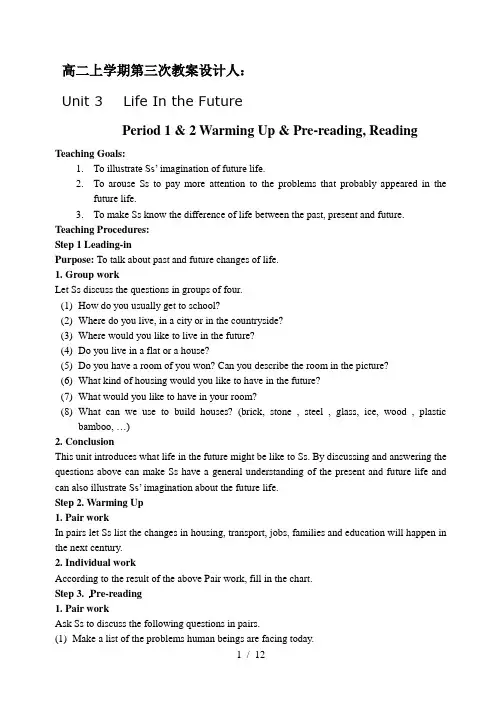
高二上学期第三次教案设计人:Unit 3 Life In the FuturePeriod 1 & 2 Warming Up & Pre-reading, ReadingTeaching Goals:1.To illustrate Ss’ imagination of future life.2.To arouse Ss to pay more attention to the problems that probably appeared in thefuture life.3.To make Ss know the difference of life between the past, present and future. Teaching Procedures:Step 1 Leading-inPurpose: To talk about past and future changes of life.1. Group workLet Ss discuss the questions in groups of four.(1)How do you usually get to school?(2)Where do you live, in a city or in the countryside?(3)Where would you like to live in the future?(4)Do you live in a flat or a house?(5)Do you have a room of you won? Can you describe the room in the picture?(6)What kind of housing would you like to have in the future?(7)What would you like to have in your room?(8)What can we use to build houses? (brick, stone , steel , glass, ice, wood , plasticbamboo, …)2. ConclusionThis unit introduces what life in the future might be like to Ss. By discussing and answering the questions above can make Ss have a general understanding of the present and future life and can also illustrate Ss’ imagination about the future life.Step 2. Warming Up1. Pair workIn pairs let Ss list the changes in housing, transport, jobs, families and education will happen in the next century.2. Individual workAccording to the result of the above Pair work, fill in the chart.Step 3. Pre-reading1. Pair workAsk Ss to discuss the following questions in pairs.(1)Make a list of the problems human beings are facing today.(2) What problems do you think people will have overcome in one thousand years? Which ones do you think will still exist in AD 3008?Suggested Answers:①The first problem I would like to point out is the decline of morality.(道德沦丧)②The second problem is the racial bias problem. (种族歧视)③The third problem , which is a most serious problem , is the rapid depletion of resources on the Earth. (资源匮乏)④Now I come to the fourth problem, the problem of the large gap between the poor and the rich . (贫富悬殊)⑤The fifth problem is the pollution problem.(环境恶化)⑥Now I would like to talk about the sixth problem, the expensive arms race problem. (军备竞争)。
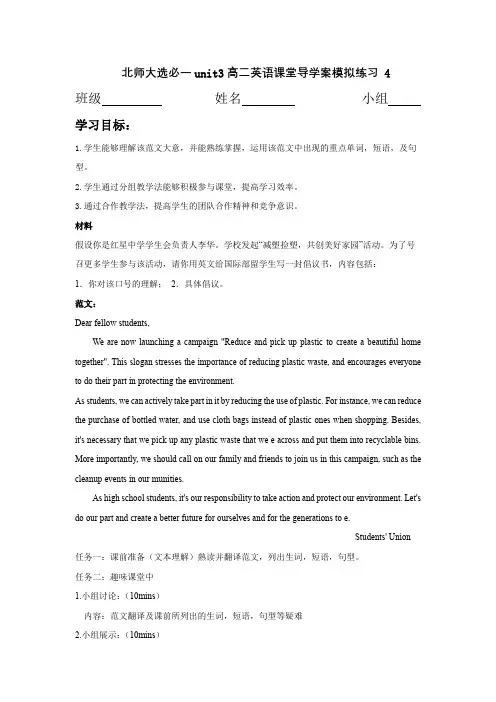
北师大选必一unit3高二英语课堂导学案模拟练习 4班级姓名小组学习目标:1.学生能够理解该范文大意,并能熟练掌握,运用该范文中出现的重点单词,短语,及句型。
2.学生通过分组教学法能够积极参与课堂,提高学习效率。
3.通过合作教学法,提高学生的团队合作精神和竞争意识。
材料假设你是红星中学学生会负责人李华。
学校发起“减塑捡塑,共创美好家园”活动。
为了号召更多学生参与该活动,请你用英文给国际部留学生写一封倡议书,内容包括:1.你对该口号的理解;2.具体倡议。
范文:Dear fellow students,We are now launching a campaign "Reduce and pick up plastic to create a beautiful home together". This slogan stresses the importance of reducing plastic waste, and encourages everyone to do their part in protecting the environment.As students, we can actively take part in it by reducing the use of plastic. For instance, we can reduce the purchase of bottled water, and use cloth bags instead of plastic ones when shopping. Besides, it's necessary that we pick up any plastic waste that we e across and put them into recyclable bins. More importantly, we should call on our family and friends to join us in this campaign, such as the cleanup events in our munities.As high school students, it's our responsibility to take action and protect our environment. Let's do our part and create a better future for ourselves and for the generations to e.Students' Union任务一:课前准备(文本理解)熟读并翻译范文,列出生词,短语,句型。
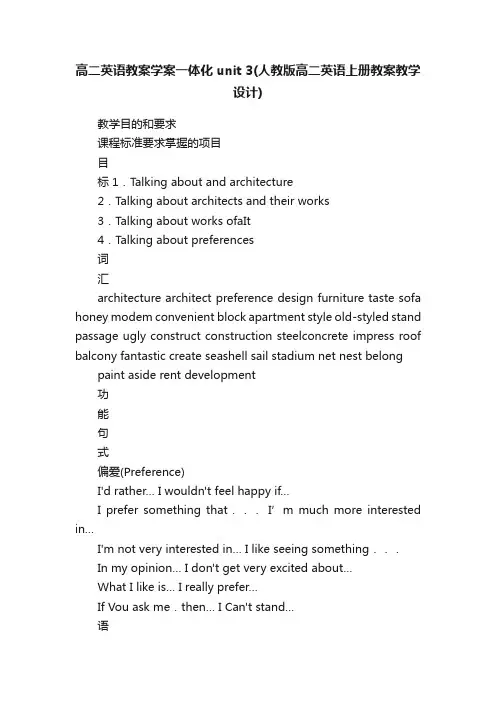
高二英语教案学案一体化 unit 3(人教版高二英语上册教案教学设计)教学目的和要求课程标准要求掌握的项目目标 1.Talking about and architecture2.Talking about architects and their works3.Talking about works ofaIt4.Talking about preferences词汇architecture architect preference design furniture taste sofa honey modem convenient block apartment style old-styled stand passage ugly construct construction steelconcrete impress roof balcony fantastic create seashell sail stadium net nest belong paint aside rent development功能句式偏爱(Preference)I'd rather… I wouldn't feel happy if…I prefer something that...I’m much more interested in…I'm not very interested in… I like seeing something...In my opinion… I don't get very excited about…What I like is… I really prefer…If Vou ask me.then… I Can't stand…语法过去分词(短语)作宾语补足语We noticed the mailbag carried onto the train.Everyone was surprised t0 see the buildings∥nished so soon.Please keep me informed oj how things are going.They weFe happy to hear the work alrea匆如.课文听力S:Can I help you? what is it you are looking for? Furniturefor the bedroom, the kitchen or the living room?D: We're looking for a fewthings, but we aren't very sure yet. We bought a new flat, and we already have some furniture, but the new house is so big. We can use a few more things, and perhaps replace some very old pieces.A: I think we need a kitchen table, one that is large enough to have dinner with five or six people.S: Very well. Ifyou would like something modern, I suggest you think of something like this. The legs of the table are silver coloured while the table top is made of thick glass. Very beautiful and very easy to clean.D: Yes, I really like that.A: No. 1 don't like such cold and hard things. I think a table made of wood would look much nicer. Wood is warm, and makes you feel comfortable.D: Honey, I knowyou like that, but I'm afraid it'll be too expensive.S: That's no problem. I can show you some really nice modern tables that look as if they were made of wood.A: Great! We are also looking for something on the wall. There's a big piece of white wall over the sofa.S: Were you thinking of a painting or perhaps a poster orsomething ...D: Yes. Could you show us something?S: Something classical?A: Oh, no. You can show us something modern. I like classical things in the kitchen and the bedroom, but our living room is quite modern, isn't it, Danny?D: By the way, we are also still looking for two comfortable chairs, something modern and classic at the same time. Would you have anything like that?S: Oh dear! Oh dear! What do you mean by that?A: Well, something classic and fine but also cool, you know.Answers to Exercise 1:kitchen table, wooden tablesAnswers to Exercise 2:True: 4, 5Answers to Exercise 3:1 things, replace, pieces2 wood, would3 warm, comfortable4 wall, sofa5 something moderm课后听力The history of architecture in China and most European countries is very different. As a result, the way people look at art and architecture has also developed along different lines.Much of China's ancient architecture was constructed of wood. Only the Great Wall and city walls were made of large bricks. Earthquakes have occurred quite often in China's history. Besides that, many temples were destroyed by fire. Sometimes the fires were caused by accident. However, it also happened that emperors would destroy temples and architecture that were built in the past. They wanted to get rid of all architecture thatreminded people of the former emperor. After burning the old temples and palaces, the emperor would have everything built new in the style that he preferred. That's why all over China we find many temples that wererebuilt or restored about 250 to 300 years ago, during the age of Qianlong. Few temples are left over from earlier times.Much of Europe's ancient architecture is 300 to 1,000 years old. Architects used natural materials, such as stone and brick to construct their buildings. There weren't many earthquakes, and unlike China, European kings would usually not bum the churches and other architecture built before their time. They constructed new buildings in the style they preferred at other places.Wood is not a very strong material. Weather conditions make repairs necessary and by the end of about-100 years usually every part of a wooden construction has been replaced. So, although the design can be hundreds of years old, every part of the building may have been made less than a hundred years ago. Stone and brick are strong enough to stand the test of time. These materials do not need to be replaced. So when looking at old buildings in Europe, we are actually looking at what was built many centuries ago. While in China the architecture may be old, what we look at is in fact quite new.语篇领悟阅读本单元课文,完成下列各题(Passage 1 )1. Why did architects in the 1920's want their buildings un-natural?A. They didn't like traditional architecture style.B. They wanted to change people's feelings of beauty.C. They didn't like building materials such as earth,stone,brick and wood.D. They like buildings materials such as steel, glass and concrete.2. In what ways is ancient architecture different from mod-ern architecture?A. materials, shapesB. roofs, cornersC. size, heightD. balconies, windows3. Which of the following belongs to modern architecture?A. Taihe Dian.B. The Temple of Heaven.C. The Opera House is Sydney.D. The great European Cathedrals.(Passage 2)4. Old buildings are pulled down becauseA. they are too smallB. they are too oldC. they are of no use any moreD. people don't like them any more5. Factory 798 was designed byA. GermansB. RussiansC. Germans and RussiansD. Chinese and Russians6. Which is NoT the benefit for people working in an oldfactory building?A. The rent is low.B. It is convenient for artists to make large objects.C. It is fairly quiet there.D. People can visit there.主旨大意7.Which of the following best expresses the main idea of Passage 1 ?A. Ancient architecture is popular.B. Modern architecture is popular.C. Ancient buildings look more beautiful than modern ones.D. Different times,different styles of architecture.8. Which of the following best expresses the main idea of Passag2?A. Factory 798 is of great value in modern times.B. People should save architecture from the past.C. People should build more factories like Factory 798.D. People shouldn't pull down old buildings.推理判断9.From Passage 1 we can infer thatA. the writer prefers ancient buildings to modern onesB. the writer prefers traditional materials to modern onesC. the writer doesn't like modern architects at allD. the writer prefers buildings which look nature that look unnature.10. From Passage 2 we can infer thatA. Factory 798 was out of use for longB. people rent Factory 798 because of his German building styleC. in many large cities, people build many factories like factory 798D. old buildings can be only used as art centres知识点1.prefer喜欢;偏好;宁愿(后接名词或代词、不定式、动名词、不定式复合结构、接从句)Which would you prefer , tea or coffee?茶和咖啡你喜欢哪一种?I prefer coffee.我更喜欢咖啡。
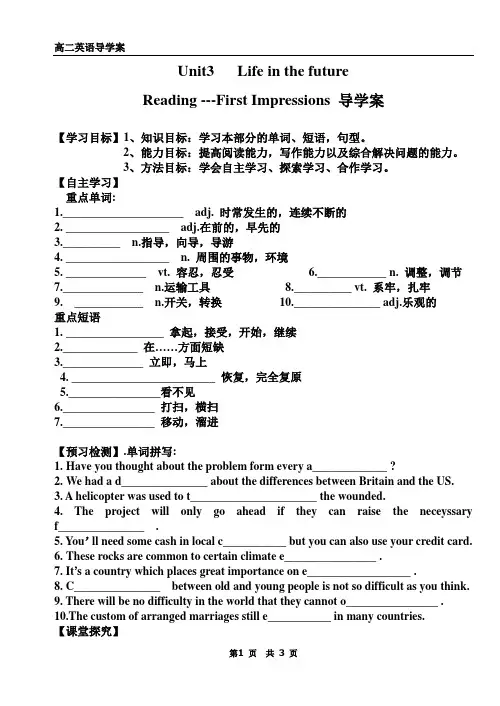
高二英语导学案Unit3 Life in the futureReading ---First Impressions 导学案【学习目标】1、知识目标:学习本部分的单词、短语,句型。
2、能力目标:提高阅读能力,写作能力以及综合解决问题的能力。
3、方法目标:学会自主学习、探索学习、合作学习。
【自主学习】重点单词:1._____________________ adj. 时常发生的,连续不断的2. __________________ adj.在前的,早先的3.__________ n.指导,向导,导游4. __________________ n. 周围的事物,环境5. ______________ vt. 容忍,忍受6.____________ n. 调整,调节7.______________ n.运输工具8.__________ vt. 系牢,扎牢9. ____________ n.开关,转换10._______________ adj.乐观的重点短语1._________________ 拿起,接受,开始,继续2._____________ 在……方面短缺3.______________ 立即,马上4. _________________________ 恢复,完全复原5.________________看不见6.________________ 打扫,横扫7.________________ 移动,溜进【预习检测】.单词拼写:1.Have you thought about the problem form every a_____________ ?2.We had a d_______________ about the differences between Britain and the US.3. A helicopter was used to t______________________ the wounded.4. The project will only go ahead if they can raise the neceyssary f_______________ .5. You’ll need some cash in local c___________ but you can also use your credit card.6.These rocks are common to certain climate e________________ .7. It’s a country which places great importance on e__________________ .8. C_______________ between old and young people is not so difficult as you think.9. There will be no difficulty in the world that they cannot o________________ .10.The custom of arranged marriages still e___________ in many countries.【课堂探究】第1页共 3 页班级:小组:姓名:评价:I.skimming1. What’s the text about? ( )A.An e-mail written by a man who has taken up a trip to the futureB. The man has his first try to master a hovering carriage.C. The man is surprised at the Wang ping’s home.D. The preparation of the trip.2.Skim the text to match the main idea with each paragraph:Para 1. A. My impressions of one thousand years into the futurePara 2. B. The journey to 3008Para 3. C. Staying in Wang Pings homePara 4. D. How I came to take a time travel journII. Careful reading1. Read the passage and answer the questions:Q1: How many people are mentioned in the text? Who are they?Q2:Why did Li Qiang travel to the year AD 3005?Q3: What did Li Qiang suffer from?Q5: How did Li Qiang overcome the lack of fresh air?Q6: What is a “time lag”flashback?2. True or False1). Wang Ping was his friend as well as his guide.( )2). The writer gave Wang Ping some green tablets, which helped a lot.( )3). Wang Ping owns a company named “Future Tours”.( )4). Before the trip, we had a calming drink which made us sleepy.( )5). I lost sight of Wang Ping because there were too many carriages.( )6). In the year AD 3008, the air in private houses was poor quality.( )【当堂检测】SummaryI have to remind myself [1]_______________ that I am [2]__________________ up this prize and I’m really in the year of AD 3008. I suffered form “time lag”that I kept getting flashbacks from [3]____________ time period. We climbed in the capsule through a small [4]__________________ . It was very comfortable. A few minutes later, the journey was completed and we had arrived. At first the[5]_____________were hard to[6]______________.Because of the[7]_____________ of fresh air, Id got a headache. So I put on a mask . Then I followed Wang Ping to collect a hovering carriage driven by computer. These carriages float above the ground and by [8]_________________ down in the seat, we can move swiftly. Wang Ping showed me how to used it, but I lost [9]_________________ of him when we reached a place where many carriages flew by in all directions. Later we arrived at a strange-looking house which had a green wall made of trees. A table and some chairs第2页共 3 页班级:小组:姓名:评价:could rise form under the floor by flashing a[10]______________________ on a computer screen. I was exhausted that night and fell asleep quickly.第3页共 3 页。
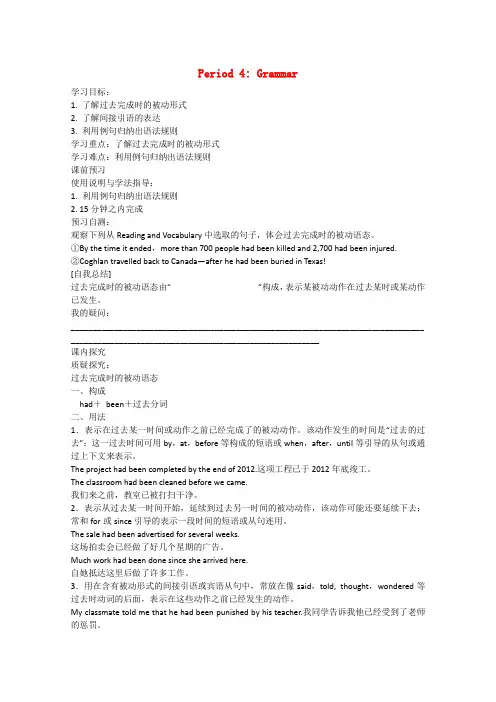
Period 4: Grammar学习目标:1. 了解过去完成时的被动形式2. 了解间接引语的表达3. 利用例句归纳出语法规则学习重点:了解过去完成时的被动形式学习难点:利用例句归纳出语法规则课前预习使用说明与学法指导:1. 利用例句归纳出语法规则2. 15分钟之内完成预习自测:观察下列从Reading and Vocabulary中选取的句子,体会过去完成时的被动语态。
①By the time it ended,more than 700 people had been killed and 2,700 had been injured.②Coghlan travelled back to Canada—after he had been buried in Texas![自我总结]过去完成时的被动语态由“ ”构成,表示某被动动作在过去某时或某动作已发生。
我的疑问:_________________________________________________________________________________ _________________________________________________________课内探究质疑探究:过去完成时的被动语态一、构成had+been+过去分词二、用法1.表示在过去某一时间或动作之前已经完成了的被动动作。
该动作发生的时间是“过去的过去”;这一过去时间可用by,at,before等构成的短语或when,after,until等引导的从句或通过上下文来表示。
The project had been completed by the end of 2012.这项工程已于2012年底竣工。
The classroom had been cleaned before we came.我们来之前,教室已被打扫干净。
2.表示从过去某一时间开始,延续到过去另一时间的被动动作,该动作可能还要延续下去;常和for或since引导的表示一段时间的短语或从句连用。
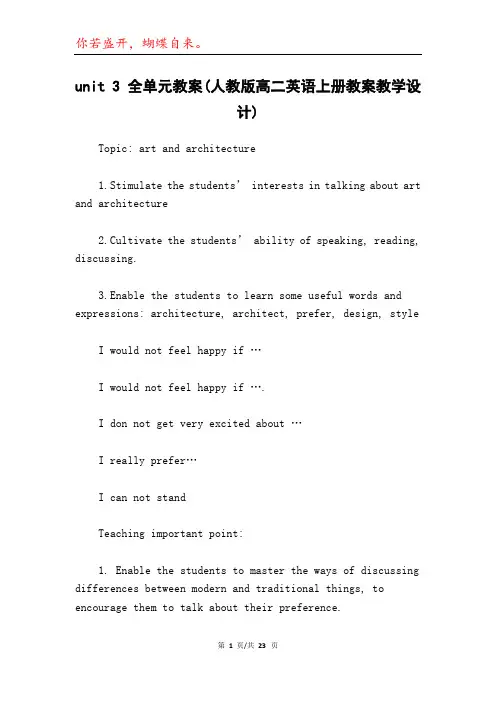
unit 3 全单元教案(人教版高二英语上册教案教学设计)Topic: art and architecture1.Stimulate the students’ interests in talking about art and architecture2.Cultivate the students’ ability of speaking, reading, discussing.3.Enable the students to learn some useful words and expressions: architecture, architect, prefer, design, styleI would not feel happy if …I would not feel happy if ….I don not get very excited about …I really prefer…I can not standTeaching important point:1. Enable the students to master the ways of discussing differences between modern and traditional things, to encourage them to talk about their preference.2. Help the students to learn about the past participle: used as object complementTeaching difficult point:Inspire the students to express their design of house.Teaching methods: free talk, communicative method to improve students’ speaking ability and communicative skills.Teaching aids: multimedia. recorder.Teaching procedures:Period 1: Warming-up and SpeakingPeriod 2: ReadingPeriod 3: Language studyPeriod 4: Listening and writingPeriod 5: Integrating skillsPeriod 1:Warming up and SpeakingStep 1. Greetings and warming-upT: Good morning, class.S: Good morning, Miss Qiu.T: where are you from, a city or a small town?Can you describe the buildings in your hometown?What kind of buildings do you live in, a traditional house or an apartment?S: …(Show students two pictures, a tall building and a traditional yard.)T: what can you see in the two pictures?S: We can see two different styles of house: block of flats and traditional house.T: What is the difference between them?Suggested answers:Block of flats Traditional houseModern.Convenient.The rooms are big.Every flat has a toilet and bathroom.Not much contact with their neighbors.People often feel lonely.Flat roof.… Old-style.The rooms are small.Sometimes no toilet or bathroom.Life is much more interesting. Neighbors get on well with each other. People can grow flowers in the yard.The roof is sloping.(why?)…T: In which house would you prefer to live? Why?S: I like living in …. because….I prefer living…I’d rather live…(For example, living in the small house makes me feel warm.I like making friends with my neighbors. It looks like a big family. Encourage them to express their ideas freely.)T: Buildings in the different places are different. So what words and phrases do you think will be useful when you want to talk about art and architecture?(Show the students some different kinds of houses, and ask them to describe them.)S: appearance: high, low, great. The palaces were large and beautiful, and they often looked like something out of a fairy tale.;materials: brick, stone, steel, glass, wood…T: If you were free to design your own dream house, what would that house look like? What materials would you use? Explain why you made certain choices about your dream house?S: ……Step 2 SpeakingT: Now let’s move to the speaking part. Turn to P18. Please listen to the sample dialogue .Pay attention to the ways how to express their preferences.(After listening to the dialogue for once)T: Ok! The dialogue is about two persons talking about their preference for styles of architecture. The noun form of “prefer” is “preference”. The stress should be put on the first syllable. Please read the word after me .S: ……T: There are some useful expressions in the dialogue. Such as “I wouldn’t feel happy if …”“I prefer something that…” “I don’t get very excited…”T: Now please look at the pictures and talk with your partner which of the things below you prefer. Try to explain why you prefer one thing to another.S: …(Show some chairs on the screen)T: In your dream houses, are there any chairs? Which one do you like? Why?Sample dialogue:A: which do you like better, classical chairs or modern chairs?B: I prefer modern chairs.A: Why?B: In my opinion, modern chairs are lighter and more colorful. They are comfortable.Step 3 . HomeworkDecorate your bedroom and classroom. And talk about your decoration.Period 2: ReadingStep1: Pre-reading(Show pictures of both modern architecture and classical architecture)T: We’ve really had a wonderful tour around the world last time, seeing the marvelous architecture home and abroad, modern and classical. I hope you enjoy that… but I wonder if all of you can recognize some of the most famous architecture.S: Sydney House; the Eiffel Tower; the Temple of Heaven…T: Among all of these pictures, which ones belong to modern architecture?S: …T: How do you know which ones belong to modern architecture? What’s the difference between modern architecture and classical architecture?S: …T: If you want to know more and to enjoy the beauty of modern architecture, you’d better join us, as we are going to havea new journey, the journey to the world of modern architecture.(Show modern architecture on the screen)Step2: While-reading1. Fast- readingT: Q1:Wha’s the difference between modern architecture and classical architecture?Q2: What kind of materials is used? What other materials do you know?Q3: What’s the characteristic? How do people feel towards modern architecture?DifferenceModern architecture Classical architectureMaterials Steel, iron, glass… Stone, brick, wood…Characteristics Huge; like boxes; unfriendly Beautiful, closer to nature2. Careful-readingT: Now please find out the information according to the key words on the screen.Modern architectureQ1: When was modernism invented? -----1920sQ2: How many architects are there in the text? ---Antonio Gaudi/ WrightQ3: What did Gaudi want to be used in his works? What’s the characteristic of his architecture? How is his architecture like?----Natural materials/ like a dream, full of fantastic colors and shapes.Q4: What inspired Wright? ----Japanese seashellsQ5: How many examples are there in the text?----The Opera House/ the new Olympic StadiumQ6: How do they look like? ----Seashell/ nestQ7: What do they (two architects / two examples) have in common? ---Nature3. ListeningT: While listening, please pay attention to the key points in the text. (Show the key points on the screen)Step3. Post-readingInterview (group work)Step4. HomeworkReport what you have learned about modern architecture next time.Period 3: Language studyStep 1 Lead-inT: Hello, everybody, yesterday we have seen a lot of wonderful modern architectures and got to know some famous architects. Today I’d like to introduce you one of my friends. He is an architect. Who can tell me the meaning of “architect”.(a person who designs buildings). He lived in this house when he was young. Do you think this house beautiful or not beautiful? (not beautiful) Can you use another word to replace “not beautiful”. (ugly). So when he became an architect, he designed some pretty houses. Not long ago he designed a new house for me. Let’s go and see my new house.Step 2 VocabularyT: Welcome to my new house. Could you say something about my new home?T: I’m not alone here, because I have two neighbors. Do you know who are they and where they live? (nest, dog house)T: Let’s learn some new words of house.(balcony concrete nest brick roof)Try to remember these new words, then fill in the blanks.1. An area with a wall or bars around it, joined to the outside wall of a building ________________.2.A strong construction material which is a mixture of stone, and sand and water _________________3.A shelter made by a bird to hold its eggs and young____________4.The structure on the top of a building to keep the rain out_________Step 3 Word StudyT: Can you tell me which is the most ancient building in my yard? (nest)A nest is to a bird what a house to a man.Who can tell me the meaning of this sentence?(鸟剿和鸟的关系就和房子和人的关系一样)T: Good. Let’s try another oneWater is to fish what air is to men.(水和鱼的关系就于空气和人的关系一样)T: Well done. These two sentences have something in common-they are using the same sentence pattern. What is it?S: →A is to B what C is to DT: Very good. Now I will show you more pictures, you should find out the relationship between these pictures, and create sentences using the above pattern.Fur is to a fox what the_____is to a banana.____are to a house what words are to a text.An architect is to_______what a painter is to art.A___is to a boat what an engine is to a car.A____is to a fisherman what a gun is to a hunter.Arms are to the body what_______are to a tree.Step 4 GrammarT: I’m very glad that you like my new home. Our new school is far away from the downtown, so a new market is build near our school. I’ll guide you to the market to see what you can do there.(show the Ss the picture and ask them to describe it.)T: What can you see in the market? Let’s see what can we do here?For examples: I can have my hair cut here. I can have my bike mended.Please make similar sentences.S:…T: In all these sentences we use a sentence pattern-“h ave something done”.Now let’s see the pairs of sentences, and compare A and B.A: I can have my bike mendedB: I can have the car waiting for me.A: I found myself tied to a tree.B: I found myself walking in a forest.T: when we use –ing form, we are using passive voice. When we use –ed form, we are using active voice.→ passive voice: -edactive voice: - ingT: Now let’s do some exercises.MatchingDid you find the city done?When will he ever get the work greatly changed?She can’t make herself called.Next week I’ll have my bedroom understood.You’ve got to keep the door locked.I got the watch repaired.She heard her name decoratedCompletingI don’t want any bad words____(say) about him behind his back.Please get the work____(do) as soon as possible.I’ll have the materials_____(send) to you next Monday morning.She won’t have her long and beautiful hair____ (cut) short.You should make your voice______(hear).I want you to keep me_________(inform) of how things are going with you.The rent sounds reasonable. How would you likeit________(pay).At last I succeeded in making myself__________(understand).We’ll move to the new school, and four people will share one room. There will be a competition on decorating your room. The most beautiful and most special room will he the winner. Now work in groups of four to design your room. Five minutes later the group leaders should give a simple report. And pay attention to use –ed form in your report.Step 5 Homework1.Workbook page 97, exercises 1-52.Workbook page 98, exercises 1-2Period4: listening and writingStep 1 : Greeting and Warming upT: The National Day is coming. I know most students in our class are waiting for the exciting day, so am I .On holiday ,we can do many exciting things. Such as going shopping, visitingbeautiful place, visiting good friends…Now I will ask some students to share your ideas. **, Please, what are you going to do on the National Day?S: …T: What about you? What’s your opinion?S: …T: On National Day, what cloth will you put on? School uniforms or cloth with personal style?T: …T: I think most students in our class will put on cloth with personal style ,because this kind of cloth can make us feel confident .Right?S :…T: It is time to buy some furniture. What kind of furniture will you buy? And why do you prefer them?S:…T: For most young person, their choices in buying furniture is very much like buying clothes, while old people often choose traditional furniture that is made of strong materials and can be used for a long time .Step 2. ListeningT: Today, we are going to learn the listening part . Turn to P18. This dialogue is about a young married couple, Danny and Amy and a shop assistant.. They want to buy some furniture for their new house. They visit a shop and talk with a shop assistant about their tastes and preferences.(Play the tape twice for the students to listen and finish the exercises by themselves. They may check the answers in pairs. Then play it a third time for the students to check their answers. Check them with the whole class in the end..)Step 3. writingT: Do you think the building in our school is beautiful?”S1: It is very beautiful…S2: The school looks like a desert ,The walls arewhite-washed and there a ren’t any art works on them.T: We think the building would be more beautiful if the school would be decorated with paintings ,photos and art works. We think art in the school could give us many new experiences and enrich our lives. But suppose that the school does not have a lot of money. How can our school be decorated? Now please work in groups of 4 to make a plan that show how the whole school can be decorated? I will give you 3 minutes to have a discussion.Suggest answer:1. Mangy art works ca be made by teachers and students.2. Art posters can be used for decorating.Step 4. Homework.T: Please write a letter to the headmaster explaining how you want to decorate the school with art works. Describe the art of your choice, what function it should have in your school and why it is important to have art in school buildings.Paragraph1. Explain why the school should be decorated.Paragraph2. Explain what function the art should have in the school.Paragraph3. Describe different types of art works that could be chosen and where they should be hung up in the school.Paragraph4. Discuss the different prices of different art works and write a plan to decorate the school as well as possible using little money .Period 5: Integrating skillsStep 1. Revision:T: Dear class, I’m especially happy these days, because I’ve just bought a new house. It’s very beautiful. Look, here it is. I want to share my happiness with you. So would you liketo help me design my house? How should I decorate my room? Please discuss it and give me some advice, OK?(Show them the sentence pattern on the screen to revise the grammar.--- You should have your walls painted white.--- You had bette r have … done. )T: Now I will call out some pairs to report their design. which group will give me good suggestions?S:…T: Thank you very much! You’re good designers. I’ll decorate my room according to your design.Step 2. Lead-inT: Now after I finished decorating the rooms, I moved into my new beautiful house. But what should I do to deal with my old house? Should I pull it down? No, I don’t want to do that. Anyway it’s so lovely a house. Should I let it stand empty? No, not a good idea. I want to give it a second life. What shall I do? Please discuss again in groups and this time give me advice on how to deal with the old house.S:…T: Wow, you have so many wonderful ideas! I think I liketo change it into a beautiful teahouse and I can rent it to somebody else since I am too busy to run it myself. And thus I can give my old house a second life. Thank you very much! Would you like to come in and have a cup of tea in my teahouse some day?Step 3. Fast readin g on “ Factory 798 ”T: Thank you for your ideas to give my old house a second life. And the same story goes with another old factory which is no longer used in Beijing. It is the famous place called “Factory 798”. Has anybody ever heard of that? If no, let’s open our books and read the passage on Page 23. Try to find out: “What is Factory 798? ” I will give you 2 minutes.(a few minutes later. )T: Who has found out the answer?S: → an old army factory ; an arts centre;Step 4. Listening and readingT: Now, let’s listen to the tape and get a better understanding of the text. Please follow the tape in a low voice and pay attention to the pronunciation of the new words and phrases which you’re not sure of. At the same time,please try to find out the following new language points in the text and see how much you can understand them in English.( Show the language points on the screen. )你若盛开,蝴蝶自来。
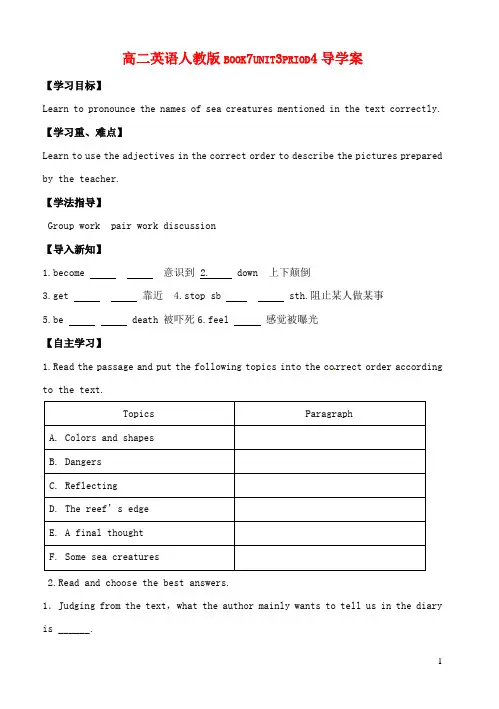
高二英语人教版BOOK7UNIT3PRIOD4导学案【学习目标】Learn to pronounce the names of sea creatures mentioned in the text correctly. 【学习重、难点】Learn to use the adjectives in the correct order to describe the pictures prepared by the teacher.【学法指导】Group work pair work discussion【导入新知】1.become 意识到2. down 上下颠倒3.get 靠近4.stop sb sth.阻止某人做某事5.be death 被吓死6.feel 感觉被曝光【自主学习】1.Read the passage and put the following topics into the co rrect order according to the text.Topics ParagraphA. Colors and shapesB. DangersC. ReflectingD. The reef’s edgeE. A final thoughtF. Some sea creatures2.Read and choose the best answers.1.Judging from the text,what the author mainly wants to tell us in the diary is ______.A.that the sea is fantastic with vivid colorsB.that the water where she was snorkelling is not deep but shallow C.what she saw and how she felt in the seaD.that all the plants in the sea are poisonous2.What was hanging upside down in the sea according to the text?A.The orange and white fish. B.The yellow-spotted red sea-slug. C.The yellow and green parrotfish. D.The blue sea-stars.3.The author was afraid of getting too close to the eel because ______. A.it has strong sharp teeth B.it has thick gr een lipsC.it ha s a frightening shape D.it gives out poisonous liquids4.Which of the following sentences show that the author couldn't help feeling excited in the sea?______A.My heart was beating wildly.B.That didn't stop me from feeling scared to death.C.Every cell in my body woke up.D.I felt very exposed in such deep clear water.【合作探究】1.Reflect reflection n.放映,反射 reflective adj 沉思的;深的reflect sth in sth 在......里映射......re flect sth from sth 从......反射......reflect on/upon认真思考2.scare sb away/off 把某人吓跑scare sb into/out of doing sth 吓得某人做/不敢做某事scared adj. 惊恐的;恐惧的 be scared to do sth 害怕干某事be scared to death 吓死3.upside down 上下颠倒乱七八糟 inside out 里面朝外turn sth upside down 把......翻得乱七八糟4.Then there were two grey reef sharks,each about one and a half metres long,which suddenly appeared from behind some coral.独立主格结构:名词/代词+形容词名词/代词+副词名词/代词+名词名词/代词+介词短语名词/代词+分词名词/代词+不定式Eg.1.The man sat in the sofa,his face serious.2.He came in ,a dictionary in his han d.3.The thief caught,he felt relieved.【达标测验】1. —I don’t think this TV set is of good quality. Can you replace it with a new one? — ___________. But I have to talk to my manager first.A. I’m sorryB. No wayC. No problemD. That’s a question2. One of the judges __________ to Gana’s film festival was a famous artist from China, Zhang Ziyi.A. invitedB. to inviteC. had been invitedD. being invited3. I was scared _______ when I saw the tiger jumped out of the cage and ran to the little child.A. to the deathB. of deathC. into the deat hD. to death4. Please post this letter in the post office nearby, and __________,I will get two tickets in the train station.A. in meantimeB. on the meanwhileC. in meanwhileD. in the meantime5. D on’t turn the room __________, as I have just tidied it.A. upside downB. insideC. outsideD. inside down6. Most parents are not __________ the danger of their babies’eating jelly, which causes most unfortunate incidents to happen.A. well aware toB. very aware ofC. aware thatD. well aware of7.Wang Gang is con si dering buyin g a com puter, i s c o n s i d e r e d t ob e a g r e a t h e l p i n our work and study.A. asB. whichC. thatD. what8.As we grow up, it always _______ that after we give something up, we gain something new in its place.A. suggestsB. promisesC. requiresD. Seems9. They ______ the _______ snake by using a special kind of powder.A. poisoned; poisonedB. poisoned; poisonousC. poisonous; poisonedD. poisonous; poison10. I need tim e to _______ on what you offered.A. considerB. reflectC. imagineD. suggest11. Wh il e s ho p pi ng, p eo p le s o me ti m es c a n’t he l p ________ i n t ob u yi n g so me t hi ng th e y d on’t really need.A. to persuadeB. persuadingC. being persuadedD. be persuaded。
Unit3 Art and ArchitecturePeriod 4 LANGUAGE STUDYTeaching aims:1. Learn to guess the meanings of words according to the context.2. Learn the structure: A is to B what C is to D.3. Help the students to summarize the features and use the past participle asobject complement.Teaching aids:A computer for macromedia useTeaching important points:Words and phrases ( furniture, convenient, roof, despite, nest...)A is toB whatC is to DGrammar (the past participle as object complement)Teaching difficult points:Grammar (the past participle as object complement)Teaching methods:pair work, games, practiceTeaching procedures:Step one: Playing a gameShow 8 words on screen. One student explain, the other guess the words.(roof ,ugly, architect, honey, net, furniture, media, nest)Step two: Observe and find a structure. Show two sentences to student.1. A nest is to bird what a house is to a man.2. We are to them what fish is to water.Let them fill in the blanks to practise the sentence pattern.1. Honey is to a bee what milk is to a cow.2. Smell is to the nose what taste is to the tongue.3. A sail is to a boat what an engine is to a car..4. Arms are to the body what branches are to a tree.5. A net is to a fisherman what a gun is to a hunter.Step three: grammarShow sentences on screen and try to find the structure.1. I got my leg broken yesterday.2. He made his voice heard.1. have/get/make/keep/leave + sb/ sth + doneI heard my name called.2. feel/find/hear/notice/see +sb/ sth +doneHow would you like the book paid for?3. like/order/wish/want sb/sth (to be) doneWith his work finished, he went home.4. with +sb/sth +doneStep four: PracticePart one:Translate the sentences using the past participle as object complement.1.我不希望别人在他背后说他的坏话。
高二英语学案Units 3-4 (B2)【知识网络】一、重点词汇与短语1.impress(1). impress作“铭刻”讲时, 是及物动词. 常用于impress sth on/upon sb “使某人铭记某事物”.例如:His words impressed themselves on my memory.他的话铭刻在我的记忆里.(2). impress还可以表示“给某人留下深刻印象”, 常用于被动语态.例如:We were deeply impressed by his words.他的话给我们留下了深刻的印象.His acting impressed me as being somewhat artificial.他的演技给我的印象是有点做作.(3). 习语: impress sb with sth.使某人牢记某事.be impressed on one’s mind/memory被印在脑海里; 留下很深的印象.(4). 同义词: affect v t给……以印象; 影响.2.close 与closely 的区别close 和closely 用作副词意义上有差别。
Close 是指距离、场所、地点等的“接近,靠近”,可以说是一种实际意义上的“接近”。
Close to有“接近,几乎,大概,差不多”的意思。
例如:We live close to the church.我们住在教堂附近。
They sat close together.他们紧挨着坐在一起。
He came close to losing his temper.他差一点发脾气了。
Closely 是指抽象意义上的“接近”,多用比喻意义,有“亲密地,严密地,仔细地”等意思。
例如:The secret must be closely guarded.这个秘密要严加保守。
He is looking at the bill closely.他正仔细地看着帐单。
Unit 3 Protecting ourselvesSection ⅣWriting你校将开展禁毒宣传,请你根据下面的表格内容和饼状图写一篇短文。
短文内容需包括青少年吸毒原因分析,介绍毒品危害,并给同学们提出建议,以便让同学们懂得如何远离毒 青少年吸毒原因分析饼状图左右,开头已写好,不计入总词数2.要求字迹工整,卷面整洁3.参考词汇:刺激 excitement 十亿billionIn modern society ,drugs are becoming a more and more serious problem in the world.__________________________________________________________________________________________________________________________________________________________________________________________________________________________________________________________________________________________________________________________________________________________________________________________________________________________________________________________________________________________________________________________________________________________________________________________________________________________________________________________________________________________________________________________________________________________________________________________________________________________参考范文:In modern society ,drugtaking is becoming a more and more serious problem in the world.The trade of drugs is widespread ,which costs up to $800 billion every year.As we all know ,drugs do great harm to our health ,even causing people to die at an early age.Meanwhile ,it directly contributes to the happening of crimes.But to our sadness ,more and more young people begin taking drugs.As is shown on the chart above,30% of the teenagers taking drugs are cheated into doing it ,and 50% are driven by curiosity.Another 15% just seek excitement or try to get rid of their anxieties.The rest try it for some other reasons.What should we do to protect us students from drugs ?I think ,we should be careful to make friends and stay away from those who always behave badly.Also ,it's very important for us to lead a healthy lifestyle and hold positive attitudes towards life.Do remember that trying drugs out of curiosity is very dangerous.这是一篇图表作文,这一类作文通常分为三段:第一段提出讨论的主题并描述图表中所阐述的现象;第二段分析产生该现象的原因;第三段发表自己的观点。
宁阳二中“四步教学法”教学案UNIT 3 A taste of English humour编写人:林建冯爱丽郝丽梅高广淇预习学案重点词汇1.vt.&vi. 滑动,滑行2.n.失败3. adj. 无家的___________ 4.Vt.&vi 克服5.adj.穿破的_______- 6.adj.直接的.__________ 7.n.耳语_____________ 8 .vt. 使惊讶__________9. vt.&vi. 使欢乐___________10.adj. 杰出的_________11. vt.&vi.摇摆_____________ 12.Vt 使信服__________重点短语1.玩文字游戏_________2.嘲笑_________3.跌倒;跌下_______4.对某人残忍____________5.有时___________6.满足于_________7. 情况比﹍﹍更差____________8.激励某人____________9. 因﹍﹍而出名___________ 10.遍及全世界____________11.一个无家可归的人__________ 12. 一个社会的失败___________13. 克服困难________ 14.对某人仁慈______________15. 以﹍﹍为背景_____________ 16. 十九世纪中期___________17.困在暴风雪中_____________ 18. 一间木房子______________19拿起____________ 20.切断____________21. 主演____________ 22. 杰出的工作____________词汇探究:1.humour ___________(形容词)2. fortunate (名词)__________3.entertain (名词)__________4.direct (名词).__________5.confidence (形容词)_________6.react (名词).____________7. performer (动词)____________ 8. occasion (形容词)________小组讨论1. Fast reading: Read the passage silently and quickly and answer the following questions, You’ll be given 5 minutes.⑴What is the main idea of the passage?A. The history of English humour.B. The films that Chaplin made.C. The humour Chaplin made in his films.D. The Gold Rush in California.【答案:C】⑵Who is the main character of the text? What is he famous for? 【Charlie Chaplin】⑶How many famous films are mentioned in the text? What are the names?________________________________________________________ ________【The Gold Rush/A Little Tramp】2. Careful reading: TRUE or FALSE?⑴Chaplin was born in poverty and at that time films were silent. ( )【T】⑵His entertaining silent movies are still popular today. ( )【T】⑶The Gold Rush is set in California in the middle of the eighteenth century. ( )【F】3.Read Para4 ,then put them in right order.A. Chaplin and his friend washed sand and expected to pick up gold, but they failed.B. They were so hungry that they boiled a pair of leather shoes.C. They were caught in a snowstorm in a small wooden house.D. Chaplin cut off the leather top of the shoe.【正确排序:A.C.B.D】全员探究1.worse off是badly off的比较级,意思是“境况比……更差”。
教案(NSEFC Book 2A Unit 3 Modern Architecture)一.教学课型:阅读课二、教材分析1.教学内容(教材内容见文末)2.教材处理3.教学目标(1).使学生了解现代建筑,现代建筑设计师以及他们的作品。
通过阅读这篇介绍性的文章,使学生能够对现代建筑形成初步的印象。
(2).使学生试着分析文章结构,并能用一、两个关键词概括每段段落大意,对文章有个整体性地把握。
(3).文章有用粗体印刷的词,学生在通读课文后能了解粗体印刷的词所指代的意思。
学生能明白代词的指代作用,理顺信息的连贯性。
(4).通过2008年奥运会体育场馆“鸟巢”的补充介绍,渗透爱国主义教育,是德育教育的一种体现。
4.教学重点和难点(1).“现代建筑”这一题材学生可能比较陌生,有些涉及到建筑类的术语及建筑师的名字等新单词都比较难,所以在阅读前应帮学生适当扫除单词的障碍,降低阅读的难度。
(2). 调动学生学习课文的积极性,提高学生的阅读能力,从文章中提取重要信息的能力,根据文章内容判断信息正误的能力。
归纳文章大意的能力。
(3).培养学生合理使用信息,表达观点的能力,提高学生的口头表达能力,协作能力及听力水平。
二.教学设计1.总体思路本节阅读课分为3部分(读前活动,阅读活动和读后活动)。
读前活动分为:(1)检查学生前一天作业。
作业要求学生从形状,风格,材料,家具和颜色5方面写一篇以“My dream house”为题的文章。
(2)单词小测试(words quiz)(3)欣赏古代和现代建筑的图片(4)根据标题猜测文章内容阅读活动分为:(1)快速阅读(2)仔细阅读并回答问题(3)段落大意填空(由于学生英语基础比较薄弱,所以采用找一,两个关键词来概括段落大意的方式,适当降低难度)。
(4)根据每一自然段的段落大意,把文章分为几部分,并概括每一部分的内容)。
读后活动:最后一段是对2008年奥运会体育场馆“鸟巢”的介绍,在这一内容之后,笔者自己书写了一篇有关“鸟巢”的简单介绍,并以此作为内容,设计了一次采访(interview).使学生能利用已有信息并可适当发挥自己的想象,与搭档形成一问一答式地采访,锻炼了学生文字组织能力以及口头表达能力。
高中二年级英语学案Units 3-4 (B2)【知识网络】一、重点词汇与短语1.impress(1). impress作“铭刻”讲时, 是及物动词. 常用于impress sth on/upon sb “使某人铭记某事物”.例如:His words impressed themselves on my memory.他的话铭刻在我的记忆里.(2). impress还可以表示“给某人留下深刻印象”, 常用于被动语态.例如:We were deeply impressed by his words.他的话给我们留下了深刻的印象.His acting impressed me as being somewhat artificial.他的演技给我的印象是有点做作.(3). 习语: impress sb with sth.使某人牢记某事.be impressed on one’s mind/memory被印在脑海里; 留下很深的印象.(4). 同义词: affect v t给……以印象; 影响.2.close 与closely 的区别close 和closely 用作副词意义上有差别。
Close 是指距离、场所、地点等的“接近,靠近”,可以说是一种实际意义上的“接近”。
Close to有“接近,几乎,大概,差不多”的意思。
例如:We live close to the church.我们住在教堂附近。
They sat close together.他们紧挨着坐在一起。
He came close to losing his temper.他差一点发脾气了。
Closely 是指抽象意义上的“接近”,多用比喻意义,有“亲密地,严密地,仔细地”等意思。
例如:The secret must be closely guarded.这个秘密要严加保守。
He is looking at the bill closely.他正仔细地看着帐单。
[拓展]由close 和closely这种意义上的区别,我们可以很轻松地区别high和highly、wide和widely等一类词。
带-ly的副词往往用作抽象意义或比喻意义,而不带-ly的副词多用作实际意义。
例如:He threw the ball high into the air.他把球高高地抛向空中。
(high 是指实际意义上的“高”)They spoke highly of his behaviour.他们高度地赞扬了他的行为。
(highly 用作比喻意义“高度地”)The dentist asked me to open wide.牙医要我张大嘴巴。
(wide 是指实际意义的“大、阔”)He is widely read.他博览群书。
(widely 是指抽象意义上的“广泛地”)3.recommend(1). recommend作“推荐; 介绍”解时, 是及物动词. 与to搭配, 表示“将……推荐给……”, 与for搭配, 表示“推荐……做……”, 与as搭配, 表示“推荐……为……”.例如:I can recommend this dish.我可以推荐这道菜.W ill you recommend a good dictionary to me?你能推荐(介绍)一本好字典给我吗?He will recommend you for the job.他将会推荐你担任那项职务.I recommend her as your secretary.我推荐她当你的秘书(2). recommend表示“建议; 劝告”讲, 可以用于以下结构: recommend doing sth指“建议/劝告做某事”: recommend sb to do, 指“劝某人做某事”: recommend后还可加that从句, 表示“建议……”.例如:I recommend going by airplane我建议搭飞机去.The doctor recommended me to take a long rest医生劝我长期修养.He recommended that the prisoners (should) be released.他建议释放俘虏.[注意]recommend引导宾语从句时, 从句动词需要用虚拟语气形式, 即“ should +do”或者do.(3). 同义词: advise/suggest vt.建议.二、词义辨析1.如何正确使用“offer,provide, supply”?offer 指主动提供。
常构成“offer sb. sth.;offer sth. to/for sb.”结构。
provid e 提供,供应,供给(有用的或必需的物品)。
常构成固定结构“provide sth.(for sb.; provide sb. with sth.”。
supply供应,供给(所需要或所要求的物品)。
常构成固定表达“supply sth. to sb.; supply sb. with sth.”。
[例如]The police are offering a big reward for any information about the murder.警方悬赏一大笔赏金给提供有关这一谋杀案情况的人。
The firm has provided me with a car.公司提供给我一辆车。
They supply gas to consumers.他们向消费者供应煤气。
2.although, though, as, in spite of和despite的区别这几个词都有“虽然, 尽管”的意思. 前三个词是连词. 而in spite of和despite是介词.(1). although和though是从属连词, though更为常用, 而although则更为正式一些.although和though引导的句子既可以放在主句前, 也可以放在主句后面. 两者在句中经常可以互换.例如:Although (though) he is a little child, he knows a lot.[注意]although和though引导的句子不能与but和however连用.例如:(误)Although he is rich, but he is not happy.(正)Although he is rich, he is not happy.(2). though引导的从句还可以用倒装语序, 即把句子中的表语, 状语提前放到句首. 而as引导的让步状语从句则必须把句子中的表语, 状语提前放到句首. 两者可以互换.例如:Tired though (as)he was, he was still working hard.[注意]如果表语是单数名词, 提到句首时需要去掉冠词a..例如:Child though (as) he is, he knows a lot of knowledge.(3). in spite of和despite是介词, 后面接名词或代词.例如:He keeps working in spite of (despite) his illness.他不顾有病, 坚持工作.In spite of (Despite) all this discomforts, the Curies worked on.居里夫妇不顾一切困难, 继续工作着.4.不同的“表达”: illustrate, suggest, express1.illustrate(以实物、例子、图解)说明,例证,阐明。
例如:The book was illustrated with color photographs.这本书配上了彩色照片。
Explain and illustrate the main use of the present perfect tense.解释并举例说明现在完成时态的用法。
2.suggest暗示,间接表明。
例如:That girl’s sun- burned face suggests excellent health.那个姑娘被太阳晒黑了的脸表明她身体非常健康。
3.express (用语言、外表、动作)表达,明显地表示。
例如:He can express himself in good clear English now after four years’ hard learning.经过四年的艰苦学习,现在他能用清楚流畅的英语表达自己的意思了。
A smile expressed her joy at the news.微笑表达了她对这个消息的喜悦心情。
三、重点句型1.Besides, no matter how well translated, something of the spirit of the original work is lost. 另外, 不管翻译得多好, 也会丢掉原著中的某些精神.no matter后接疑问代词或疑问副词, 引导让步状语从句, 意为“不管……; 无论……”.如:If that idea was wrong, the project is bound to fail, no matter how good all the other ideas might be.2.Usually remembered for other work than their poetry are eighteenth century poets such as Pope and Johnson. 不是因为诗, 而是因其他杰作让人不能忘怀的还有18世纪的蒲柏和约翰逊等.为了强调, 此句的语序颠倒了. 正常的语序是:Eighteenth century poets such as Pope and Johnson are usually remembered for other work than their poetry.be remembered for “因……被人怀念, 纪念或尊敬”Mr. Smith will be remembered for his generosity to the poor.比一比be remembered asthan此处意为“除……之外; 除……以外”, 常放在other, otherwise, else等词后.如:I have no other friends than you.other than [常用与否定句]除了: 除……之外You can’t get to the island other than by boat.3.Viewed from the top, it looks as if the stadium is covered by a gray net of steel and it looks just like a bird’s nest made of tree branches. 从上面看, 这座体育馆像是被一个灰色的钢筋网盖住了, 它看上去就像一个用树枝垒起来的鸟巢.V iewed from the top是过去分词作条件或时间状语, 相当于If it is viewed from the top.如:Used economically, one tin will last for at least six weeks.i t looks as if是常用句型, 意为“看起来像……”. As if从句中常用虚拟语气, 但如果放在look, seem, taste, smell等动词后时, 却常用陈述语气.如:The milk smells as if it is sour.四、语法复习过去分词作复合宾语在英语中,有些动词只带一个宾语,句子意思还很不完整,须另带一部分说明宾语的情况或状态,我们就把这一部分叫做宾语补足语,或复合宾语。